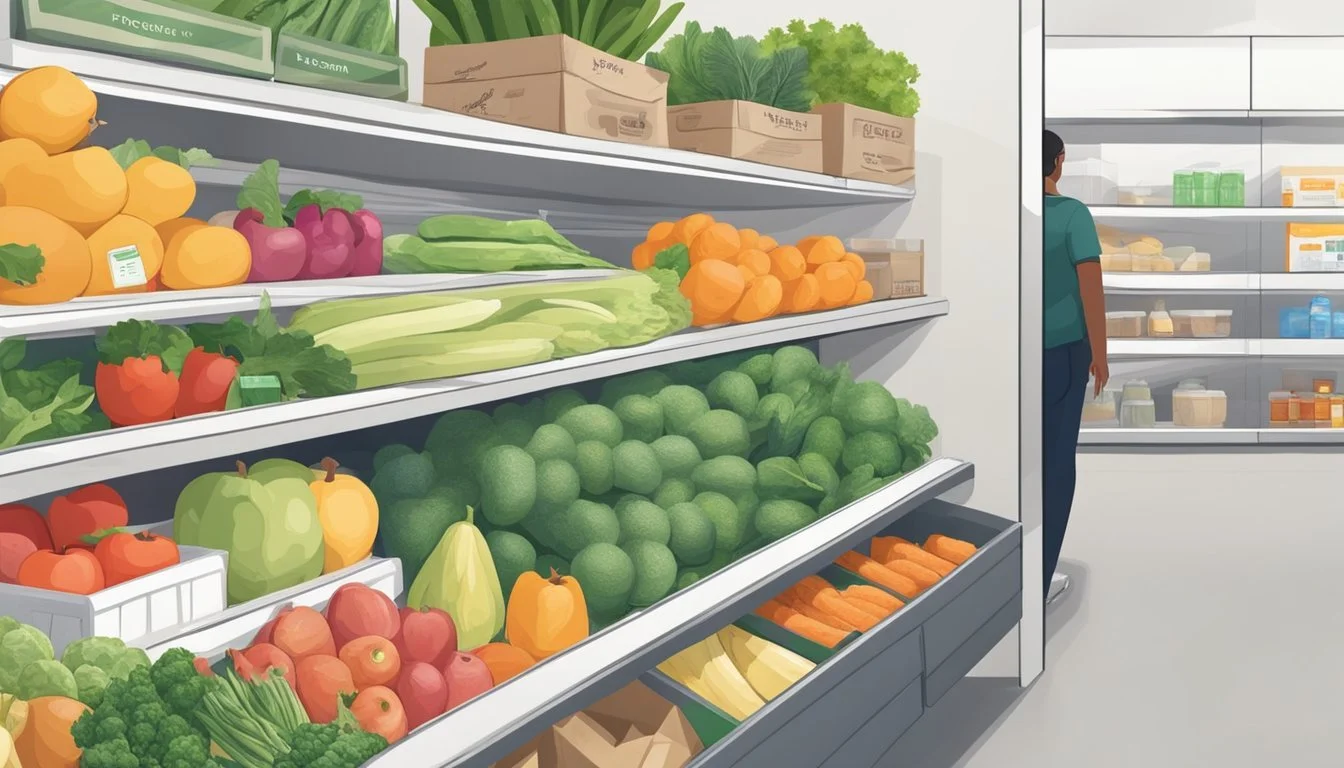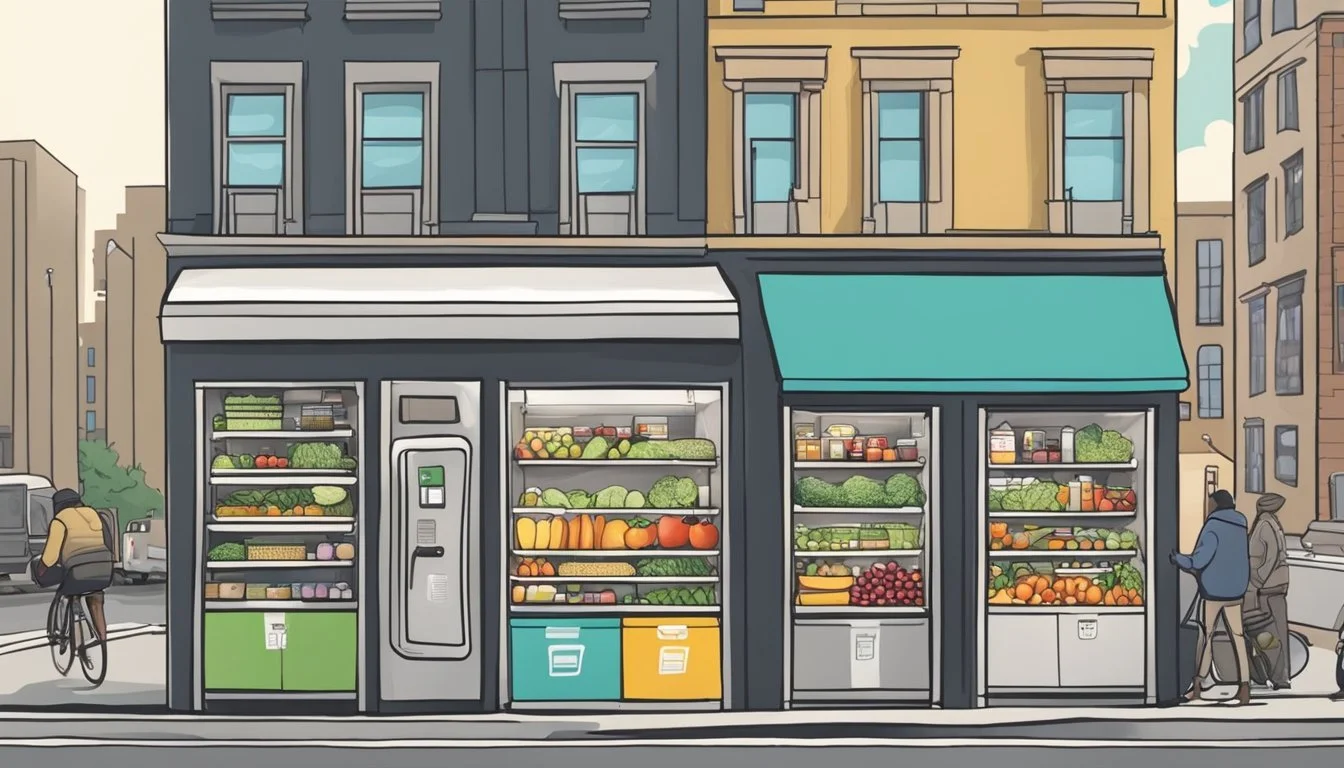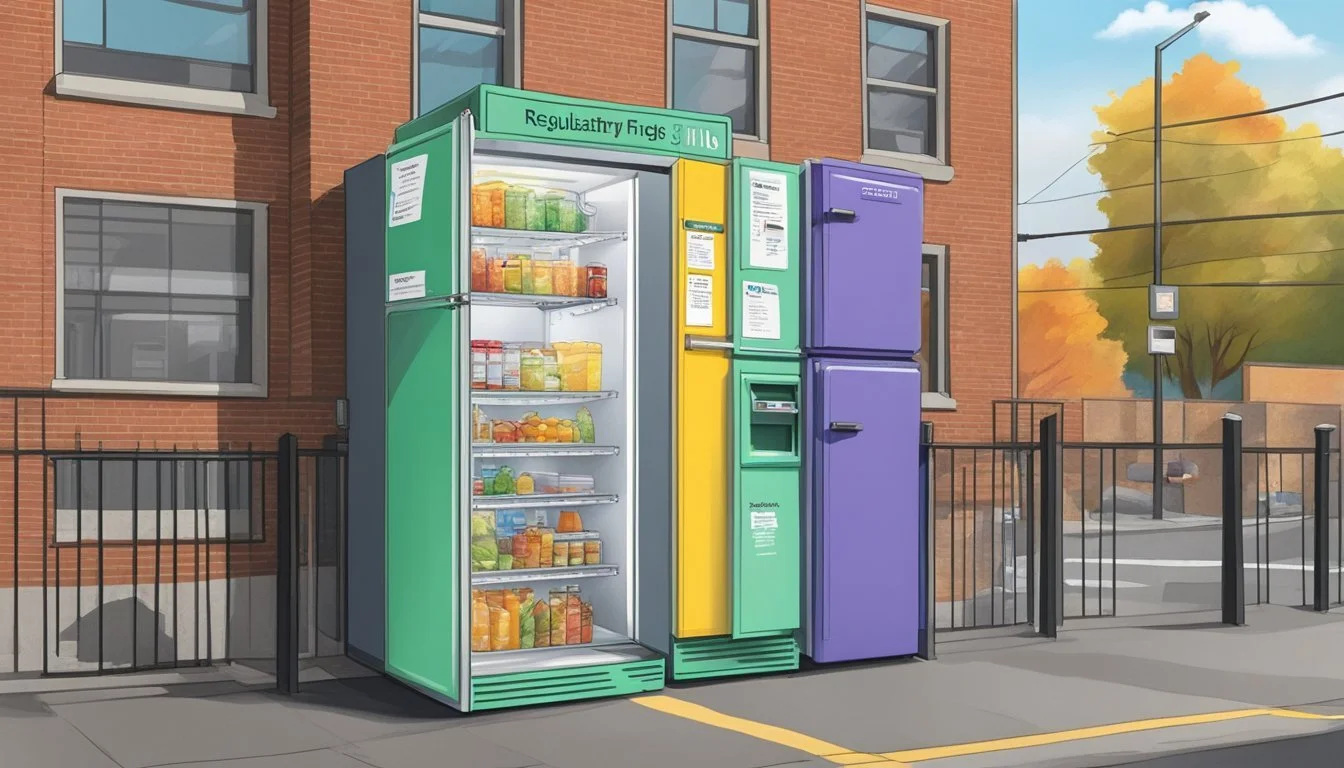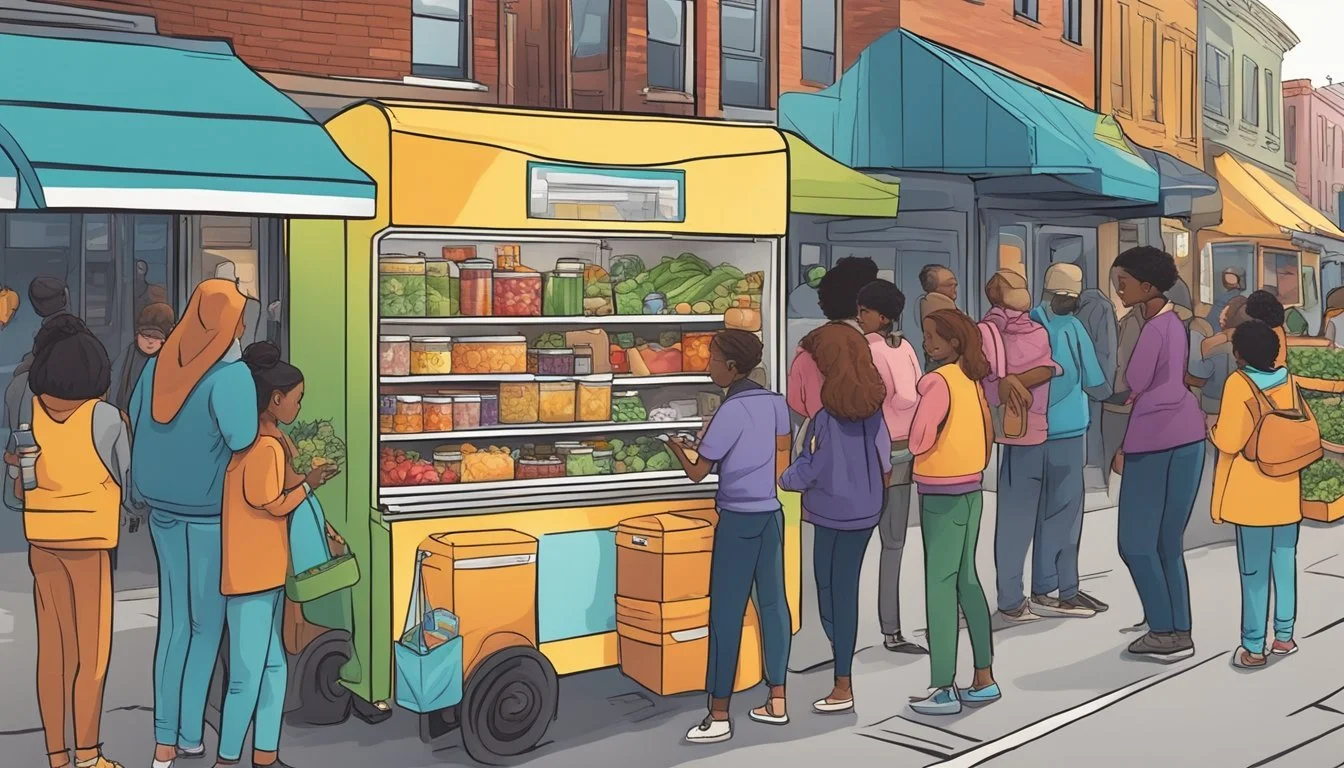Pittsburgh, PA Community Fridge
Nourishing Neighborhoods Through Share and Care
Community fridges have emerged as a beacon of mutual aid and food security in Pittsburgh, Pennsylvania. These public refrigerators are accessible to everyone, aimed at reducing food waste while providing free perishable goods to those in need. The concept relies on the honor system, where residents and local businesses are encouraged to leave food for others to take as needed. In Pittsburgh, several organizations have taken the initiative to establish community fridges throughout the city, embodying the spirit of community support and resource sharing.
Notably, the Penn Hills Library Community Fridge represents a collaborative effort to combat food insecurity. Engaging in partnerships with organizations such as the Greater Pittsburgh Community Food Bank, 412 Food Rescue, and various local businesses and food producers, the fridge provides a wide range of food items. These initiatives are tailored to serve the residents of Pittsburgh, underscoring the community's commitment to ensuring that surplus food is used productively rather than going to waste.
Pittsburgh's initiative reflects a broader movement throughout the United States where community fridges act as pivotal points for fostering local solidarity. The fridges are more than just food sharing sites; they are symbols of hope, and promote a collective responsibility towards the well-being of all community members. With the growing number of fridges and their successful management, Pittsburgh is contributing to a sustainable model that other cities might replicate, enhancing food security within communities across the nation.
Overview Of Community Fridges In Pittsburgh
Community fridges in Pittsburgh offer a unique solution to the pressing issues of food insecurity and food waste. These refrigerators, placed in public spaces, are a testament to the power of communal effort and sharing.
The Concept of Community Fridges
Community fridges are simple in concept: they are public refrigerators where anyone can donate food or take it, based on need. The core principle behind this idea is combating food waste while addressing food insecurity. They operate on a no-questions-asked basis, with the goal of making perishable food freely available to all community members. The honor system underpins the entire operation of a community fridge.
History and Growth in Pittsburgh
In Pittsburgh, the introduction of community fridges has been a collaborative effort among various local organizations and individuals. Partners include the Greater Pittsburgh Community Food Bank, 412 Food Rescue, Aldi, SHEETZ, and Panera Bread, among others. These refrigerators have become increasingly popular providing accessible sources of food, redistributing substantial amounts of food waste, and saving households and community groups significant amounts of money.
The proliferation of community fridges across Pittsburgh demonstrates a meaningful response to issues of sustainability and community welfare. With regular restocking days and a variety of partners, the fridges continue to grow in number and impact.
How Community Fridges Work
Community fridges, also known as solidarity fridges or honesty fridges, are a resourceful approach to providing free food to those in need while combating food waste. They are managed through collective effort and rely on the honor system.
Operation and Maintenance
Operations of community refrigerators in Pittsburgh are designed for ease of access and depend on regular maintenance to ensure food safety. Specific tasks include:
Cleaning: Regular sanitization to meet health standards.
Food Safety Checks: Frequent monitoring to remove expired or spoiled items.
Temperature Control: Constant temperature regulation to keep food fresh.
Repair Work: Immediate attention to any technical issues to avoid food spoilage.
Maintenance responsibilities often fall to local volunteers or partnering organizations, which operate the fridge and ensure that it is stocked and functional.
Community Involvement and Honor System
The success of community refrigerators lies heavily in local participation. Key components include:
Food Donation: Individuals and businesses donate surplus perishable and non-perishable food items.
Food Retrieval: Those in need freely access the fridge with no stigma attached.
Volunteering: Community members help with operations, contributing to a cycle of giving and receiving.
The honesty fridges depend on the honor system, trusting that individuals will take only what they need and contribute if they can. It underscores a mutual respect and solidarity within the community, as everyone has a shared responsibility to the fridge's sustainability.
Locations Of Pittsburgh's Community Fridges
Pittsburgh's network of community fridges provides crucial support for food security. Each fridge location offers free perishable food and is an integral resource for the residents.
Penn Hills Library Community Fridge
The Penn Hills Library on Stotler Road hosts a Community Fridge, a testament to local collaborative efforts. This fridge benefits from partnerships with organizations such as the Greater Pittsburgh Community Food Bank and local grocery stores.
North Side - The Garden Café
On Pittsburgh's North Side, The Garden Café stands out not only for its cuisine but also for its contribution to the community in the form of a publicly accessible fridge, creating a hub for food sharing and reducing waste.
Other Notable Locations
While specific addresses are not listed, it's important to recognize that additional community fridges are dispersed throughout Pittsburgh. These serve as vital points for the local community to access free food and contribute to a sustainable food system city-wide.
Engaging With Community Fridges
Community Fridges in Pittsburgh are pivotal in connecting the community, providing essential items to those in need, and reducing food waste. They operate on the principle of sharing resources and support from both individuals and local businesses.
How to Contribute and Donate
Individuals and local businesses can contribute to Community Fridges by donating a variety of items. It's important to focus on the need for fresh and nutritious food, ensuring donations like milk, fresh fruit and vegetables, and breakfast items are regularly replenished. Non-perishable goods such as canned goods and snacks are also welcomed for their longer shelf life. Beyond food, essential non-food items like pads, tampons, and diapers play a crucial role in supporting community members' basic hygiene needs.
To donate, one can drop items directly at the fridge locations during designated times. It is often recommended to contact the coordinating organization to understand specific needs and avoid waste.
Items to Donate Considerations Fresh fruits & vegetables Ensure items are clean and within use-by dates Dairy products like milk Keep refrigerated and check for allergies Canned goods Avoid damaged or expired cans Hygiene products Sealed and in original packaging
Accessing Food and Other Items
The Community Fridges are situated in accessible public spaces to ensure that everyone, regardless of their circumstance, can access the food and items they need without barriers. They follow the simple policy: take what you need, give what you can. There is no need for identification or proof of need; the honor system prevails to create an inclusive, trusting environment.
When accessing food and items from a Community Fridge, recipients should check for the freshness and expiration date of food items to ensure safety. Fresh produce and perishables like juice and dairy products are usually available, along with staples that can be used to prepare meals. The Community Fridge is restocked periodically by community partners, so availability may vary from day to day.
Sustainable Impact
Pittsburgh's Community Fridge initiative is making a tangible difference in sustainable living. Through reducing food waste and promoting food security, the program also provides notable environmental and social benefits.
Reducing Food Waste
Community Fridges in Pittsburgh are instrumental in diverting surplus perishable food away from landfills. For instance, a single fridge can redistribute 12 tons of food waste over three months. By serving as a drop-off point for businesses and individuals, these fridges ensure that excess food reaches those who need it rather than being discarded.
Promoting Food Security
The initiative saves households and community groups over $10,000 worth of food. This substantial saving is achieved by offering free, nutritious food to all community members, addressing food insecurity head-on. By relying on the honor system, the fridges provide a unique way to ensure that the abundance of food in the community is accessible to everyone.
Environmental and Social Benefits
The program partners with various local organizations such as the Greater Pittsburgh Community Food Bank and 412 Food Rescue to keep the shelves stocked, which not only minimizes waste but also fosters community spirit and cooperation. Additionally, the environmental benefit of reducing waste goes hand-in-hand with the social advantage of supporting vulnerable populations with access to nutritious food.
Community and Support Networks
The Pittsburgh Community Fridge initiative thrives on an extensive network of local and national organizations working synergistically. Numerous volunteer and support opportunities further energize the movement toward food security and waste reduction.
Local and National Organizations
In Pittsburgh, several local organizations, including Greater Pittsburgh Community Food Bank, 412 Food Rescue, and Good Food Project, actively contribute to the success of community fridges. These organizations work in collaboration to restock shelves and provide fresh meals for those in need.
Greater Pittsburgh Community Food Bank operates with an extensive network to attain and distribute food resources efficiently.
412 Food Rescue focuses on redirecting food that would otherwise go to waste, bringing it to community fridges amongst other locations.
Good Food Project is known for supplying delicious, fresh meals to the freezers of these community fridges.
These organizations, alongside smaller community groups and businesses like Aldi, SHEETZ, and Dollar General, form the backbone of a robust support network for the community fridges.
Volunteer and Support Opportunities
The sustainability of Pittsburgh's Community Fridge initiative rests heavily on volunteers and contributors.
Volunteering: Community members are invited to help with food collection, fridge stocking, and maintenance.
Donations: Financial and food donations are crucial, providing the necessary resources to keep the fridge stocked with diverse food options.
These opportunities not only aid in tackling food insecurity but also foster a sense of community spirit and responsibility towards the environment.
Regulatory and Health Considerations
When engaging with community fridge initiatives, it's imperative to navigate the complexities of local laws and health and safety regulations. These guidelines ensure that such efforts are aligned with public health standards and legal requirements.
Health and Safety Regulations
Local laws in Pittsburgh dictate that community fridges must adhere to specific health and safety regulations to prevent foodborne illnesses and ensure the well-being of those they serve. These regulations include:
Proper storage: Temperatures must be consistently monitored and maintained to keep perishable goods safe.
Food Handling: Safe handling practices to avoid contamination must be followed by all participants in the fridge operations.
The Community Fridge Network bolsters efforts to maintain these standards through the dissemination of clear guidelines and support for these critical areas.
Community Fridge Network and Guidelines
The Community Fridge Network is a foundational element in supporting the establishment and operation of Pittsburgh's community fridges. It provides comprehensive guidelines that detail:
Collaboration: How to foster a collaborative network among community fridge organizers, ensuring shared understanding and adherence to health and safety protocols.
Best Practices: Dissemination of best practices, including clear and readily available food safety policies to guide day-to-day operations.
By embracing these considerations, community fridges can sustainably serve Pittsburgh residents, providing access to nutritious food while maintaining public trust in their services.
Global Perspectives
The community fridge concept in Pittsburgh is a reflection of a global movement to alleviate food insecurity and reduce food waste. Similar initiatives have been launched across the globe, each adapting to local circumstances and experiences.
Similar Initiatives Worldwide
Community fridges have a presence that spans continents, with countries like Spain, Germany, the United Kingdom, and Ireland all hosting their versions. In Spain, Solidarity Fridges operate with food donated by businesses and individuals. Germany has established various Food Sharing stations where citizens can leave or pick up food. The UK's Community Fridge Network has grown significantly, supported by environmental charity Hubbub. Ireland's response includes the Community Fridge in Dublin to tackle food waste and provide for those in need.
Spain: Solidarity Fridges
Germany: Food Sharing Stations
UK: Community Fridge Network by Hubbub
Ireland: Community Fridges in Dublin
Diverse Models and Local Adaptations
The U.S has seen different models of community fridges, with local adaptations ensuring the initiatives serve the specific needs of their communities. Pittsburgh's concept is not isolated but part of this broader, adaptable model.
Local Adaptations: In Pittsburgh, community fridges pair with organizations like the Greater Pittsburgh Community Food Bank and local businesses, aligning with local needs and resources.
Diverse Experiences: Each country and community brings its own unique approach, whether it’s through artistic expression, as seen in some fridges' exteriors, or in the operational details, such as restock schedules and partnerships.
These community refrigerators are not just about food distribution, but also about building community resilience and fostering a culture of sharing and caring that resonates worldwide.
Expanding The Reach
Pittsburgh's Community Fridge initiative continuously seeks to extend its services and enhance its impact. Efforts are primarily focused on broadening the existing network of fridges and raising awareness about food insecurity.
Strategies to Grow the Network
Community Involvement: The success of the Community Fridge network hinges on community support. Therefore, strategies include:
Partnership Building: Collaborating with local businesses and organizations to host new fridge locations.
Volunteer Recruitment: Increasing the number of volunteers to manage and maintain the fridges.
Resource Allocation: To expand, the program ensures that resources are well-distributed, highlighted by:
Food Redistribution: Delivering surplus perishable food to areas with the highest need.
Financial Support: Seeking donations to save households and community groups money on food costs.
Educational and Awareness Programs
Information Dissemination: Educational efforts aim to inform the public about:
The function of Community Fridges, operating on an honor system.
The benefits—the Penn Hills Community Fridge redistributes tons of food waste, illustrating the significant impact on food savings.
Promotional Activities: Awareness is raised through various channels:
Local Media: Utilizing local news outlets to share success stories from existing fridges.
Community Outreach: Conducting events and workshops that provide practical information on how to contribute to and benefit from the fridges.
Upcoming Events and News
The Pittsburgh Community Fridge initiative continues to serve as a cornerstone for sustainability and communal support. The section below details the latest happenings, from restock schedules to recent media attention.
Restock Days and Community Gatherings
Penn Hills Library Community Fridge
Restock Days: Bi-weekly on Tuesdays and Thursdays.
Community Gatherings: Monthly meetings on the first Saturday.
The community is welcome to contribute or collect items during restock days. These events often become informal communal gatherings, strengthening neighborhood bonds.
Media Coverage and Updates
Recent Articles
Penn Hills Community Fridge Flourishes: Covered by TribLIVE, highlighting increased food security.
Highlight on Volunteers: Special mention of Gayle Pazerski, a dedicated volunteer organizing restock efforts.
Media Update
Next Feature: The program is slated for a spotlight segment on local radio, detailing its impact and future goals.
Frequently Asked Questions
This section addresses the critical steps involved in starting a community fridge in Pittsburgh, PA, and responds to typical concerns regarding the initiative.
5 Step Guide to Starting a Fridge
To establish a community fridge in Pittsburgh, one can follow a five-step process, ensuring a methodical and effective approach:
Partner with Local Organizations: Collaboration with organizations like the Greater Pittsburgh Community Food Bank and 412 Food Rescue aids in sourcing food for the fridge.
Find a Suitable Public Space: Accessibility is key; the fridge should be placed where community members can freely access it.
Ensure Regular Maintenance: Regular cleaning and restocking are crucial. Collaboration with local businesses and volunteers can help maintain a well-stocked fridge.
Build Community Awareness: Through flyers, social media, and community events, awareness raises support and usage of the fridge.
Implement the Honor System: The community fridge operates on trust, allowing everyone to take what they need and give what they can.
Addressing Common Concerns
When implementing a community fridge, questions about safety, operations, and sustainability often arise:
Safety Regulations: Proper protocols are observed to ensure the food shared is safe for consumption.
Sustainability: Continuous local support and donations are the foundation that keeps the fridge operational and beneficial for the community.
Operation Structure: Regular restock days are established, relying on the consistent contribution of surplus perishable items from community partners.
Conclusion
Community Fridges in Pittsburgh have become essential resources for addressing food insecurity. They operate on an honor system, making nutritious food accessible to all members of the local community. Collaborations with regional organizations and businesses such as the Greater Pittsburgh Community Food Bank and local grocery stores have crucially strengthened these initiatives.
The fridges have exhibited success, with one fridge reportedly redistributing 12 tons of food waste over three months and saving local households and community groups an estimated value of over $10,000 worth of food. They represent not just a solution to hunger but also a strategy for reducing food waste.
Several local establishments, including libraries and cafés, have shown solidarity by either hosting a Community Fridge or supporting the cause. These community partnerships ensure a steady supply of food, with certain locations having designated restock days.
The North Hills Community Outreach main office and places like The Garden Cafe reflect the community's commitment. They enhance food availability while fostering a sense of community solidarity.
Pittsburgh's Community Fridge movement demonstrates a practical initiative for local resource sharing that serves as a model for other cities.
Key Partners Contributions Food Banks Food donations Local Businesses Food supplies and support Libraries Hosting and logistical support Cafés Space and community engagement
In essence, Pittsburgh's approach provides an effective template for combining urban resource management with community welfare.














